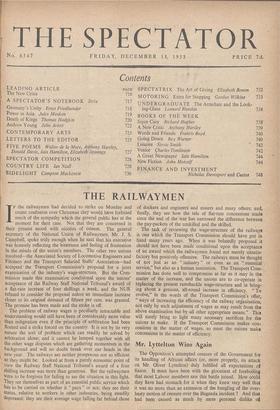THE RAILWAYMEN
The problem of railway wages is peculiarly intractable and understanding would still have.been of considerably more value than indignation even if the principle of arbitration had been flouted and a strike forced on the country. It is not by its very nature the sort of problem which can readily be solved by arbitration alone; and it cannot be lumped together with all the other wage disputes which are gathering momentum in the background and will no doubt break over our heads in the new year. The railways are neither prosperous nor as efficient as they might be. Looked at from a purely economic point of view the Railway Staff National Tribunal's award of a four shilling increase was more than generous. But the railwaymen were to be forgiven for failing to see the situation in this light. They see themselves as part of an essential public, service which has to be carried on whether it " pays " or not; they see their status, relative to workers in other industries, being steadily depressed; they see their, average wage falling far behind those of dockers and engineers and miners and many others; and finally, they see how the tale of flat-rate concessions made since the end of the war has narrowed the difference between the pay-packets of the unskilled and the skilled.
The task of reviewing the wage-structure of the railways is one which the Transport Commission should have put in hand many years ago. When it was belatedly proposed it should not have been made conditional upon the acceptance of an award which the railwaymen found not merely unsatis- factory but positively offensive. The railways, must be thought of not just as an " industry " or even as an " essential service," but also as a human institution. The Transport Com- mission has done well to compromise as far as it may in the matter of the increase, and the unions are to co-operate in replacing the present ramshackle wage-structure and in bring- ing about a genuine, all-round increase in efficiency. " To evolve," in the words of the Transport Commission's offer, "ways of increasing the efficiency of the railway organisation, not only by such adjustment of wages as may result from the above examination but by all other appropriate means." This will surely bring to light many necessary sacrifices for the unions to make. If the Transport Commission makes con- cessions in the matter of wages, so must the unions make concessions in the matter of efficiency.










































 Previous page
Previous page